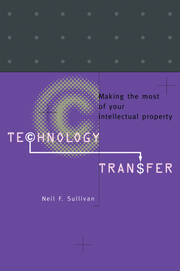Book contents
- Frontmatter
- Contents
- Prologue
- Acknowledgements
- 1 Bringing your technology to market
- 2 So do you really have something of value?
- 3 The first steps towards commercialisation of your technology
- 4 The difficult problem of valuation of intellectual property
- 5 Developing your ideas
- 6 The licensing option
- 7 Forming your own company
- 8 Financing the business start up
- 9 Make your technology a commercial success
- 10 Conclusion
- Appendices
- Index
10 - Conclusion
Published online by Cambridge University Press: 02 November 2009
- Frontmatter
- Contents
- Prologue
- Acknowledgements
- 1 Bringing your technology to market
- 2 So do you really have something of value?
- 3 The first steps towards commercialisation of your technology
- 4 The difficult problem of valuation of intellectual property
- 5 Developing your ideas
- 6 The licensing option
- 7 Forming your own company
- 8 Financing the business start up
- 9 Make your technology a commercial success
- 10 Conclusion
- Appendices
- Index
Summary
The empires of the future are the empires of the mind.
Sir Winston Churchill In Onwards to Victory, 1944The biotechnology business environment
The biotechnology industry is now entering a renaissance, as the initial excesses of expectation evaporate and many start-up companies begin their journeys with more experienced management and better directed investment criteria. Hopefully this will lead to fewer mistakes in the market place. The science associated with biotechnology is burgeoning outwards at a considerable rate, and we can reasonably expect the number of licensing deals and the preponderance of startup companies to increase. The change in UK government policy to both encourage and expedite the transfer of technology from our research base will help create a positive environment for biotechnology, thus allowing these opportunities to assume their rightful place as a significant contributor to national wealth and prosperity. If this text has given you an insight into these processes, removed some of the mystique of the commercial world and helped facilitate the transfer of your technology into the market place, then it will have succeeded in its purpose.
Perhaps more so than in any other industry, research is the lifeblood of biotechnology. The basic research breakthroughs of the late 1970s and early 1980s have opened an unprecedented Pandora's box of opportunity, procedures and applications that were once in the realm of fantasy, but are now with us.
- Type
- Chapter
- Information
- Technology TransferMaking the Most of Your Intellectual Property, pp. 197 - 204Publisher: Cambridge University PressPrint publication year: 1995



